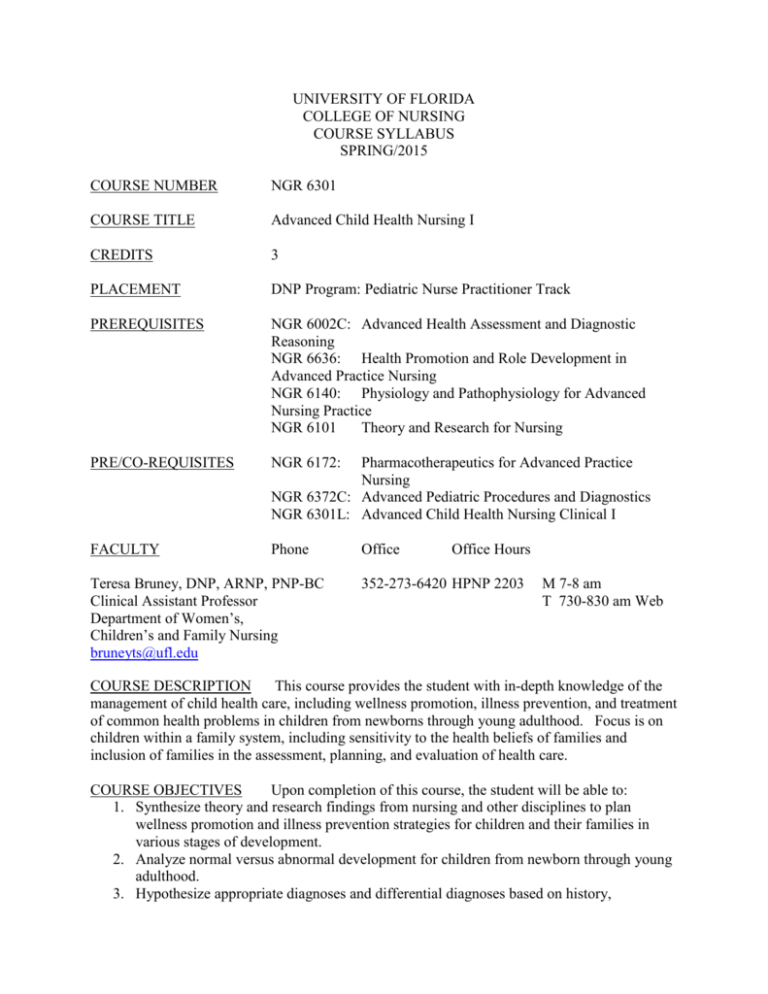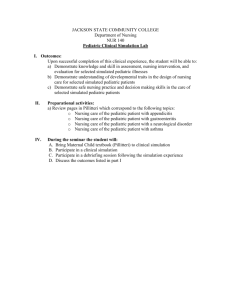PLACEMENT DNP Program: Pediatric Nurse
advertisement

UNIVERSITY OF FLORIDA COLLEGE OF NURSING COURSE SYLLABUS SPRING/2015 COURSE NUMBER NGR 6301 COURSE TITLE Advanced Child Health Nursing I CREDITS 3 PLACEMENT DNP Program: Pediatric Nurse Practitioner Track PREREQUISITES NGR 6002C: Advanced Health Assessment and Diagnostic Reasoning NGR 6636: Health Promotion and Role Development in Advanced Practice Nursing NGR 6140: Physiology and Pathophysiology for Advanced Nursing Practice NGR 6101 Theory and Research for Nursing PRE/CO-REQUISITES NGR 6172: FACULTY Phone Pharmacotherapeutics for Advanced Practice Nursing NGR 6372C: Advanced Pediatric Procedures and Diagnostics NGR 6301L: Advanced Child Health Nursing Clinical I Teresa Bruney, DNP, ARNP, PNP-BC Clinical Assistant Professor Department of Women’s, Children’s and Family Nursing bruneyts@ufl.edu Office Office Hours 352-273-6420 HPNP 2203 M 7-8 am T 730-830 am Web COURSE DESCRIPTION This course provides the student with in-depth knowledge of the management of child health care, including wellness promotion, illness prevention, and treatment of common health problems in children from newborns through young adulthood. Focus is on children within a family system, including sensitivity to the health beliefs of families and inclusion of families in the assessment, planning, and evaluation of health care. COURSE OBJECTIVES Upon completion of this course, the student will be able to: 1. Synthesize theory and research findings from nursing and other disciplines to plan wellness promotion and illness prevention strategies for children and their families in various stages of development. 2. Analyze normal versus abnormal development for children from newborn through young adulthood. 3. Hypothesize appropriate diagnoses and differential diagnoses based on history, 4. 5. 6. 7. presenting symptoms, physical examination, and diagnostic testing for children with selected common health problems. Hypothesize appropriate diagnostic and therapeutic interventions and evaluation plans based on research and evidence-based practice guidelines with emphasis on safety, cost, efficacy, developmental age and family/cultural considerations for children with health risks and/or common health care problems. Synthesize knowledge, theory and research findings, including learning theory, to develop plans to promote effective parenting skills for children at various stages of development. Evaluate interdisciplinary and collaborative community relationships and resources in providing comprehensive health care for children. Apply legal and ethical issues related to the delivery of primary health care to children by pediatric nurse practitioners COURSE SCHEDULE E-Learning in Canvas is the course management system that you will use for this course. ELearning in Canvas is accessed by using your Gatorlink account name and password at https://lss.at.ufl.edu/. There are several tutorials and student help links on the E-Learning login site. If you have technical questions call the UF Computer Help Desk at 352-392-HELP or send email to helpdesk@ufl.edu. Class will meet weekly live on the web via Adobe Connect Mondays 9am-12pm. Lectures will be recorded and available for viewing via the course E-Learning in Canvas website within 24 hours of presentation. Live attendance is not required other than for the first face to face class 1-6-14, 8am-noon in the NRC. For those students who prefer a live lecture, this course will be offered live through the web via Adobe Connect, Mondays 9am-12pm. To join the meeting: http://ufcon.adobeconnect.com/bruneypedsclass/ ---------------If you have never attended an Adobe Connect meeting before: Test your connection: http://ufcon.adobeconnect.com/common/help/en/support/meeting_test.htm Get a quick overview: http://www.adobe.com/products/adobeconnect.html This course will use one of UF’s web hosted collaborative software applications (Adobe Connect) for lecture presentation, and will record your written text comments. If you do not want to be recorded please notify assigned faculty member prior to the first class. You will not need to provide a photo or use the video comment option. The recordings will be accessed through web links provided by your faculty member and should not be shared with anyone not enrolled in the course. The recordings are available to the class during the semester. The recordings will not be used in another course. It is important that you regularly check your Gatorlink account email for College and University wide information and the course E-Learning site for announcements and notifications. Course websites are generally made available on the Friday before the first day of classes. TOPICAL OUTLINE A. General developmental approach of the family unit and child health needs related to management of newborns through adolescence. B. Systematic approach to well child care and common health problems of children. Each of the following will be considered throughout the course: 1. Symptom cluster presentation 2. Objective findings: physical exam, history, diagnostic testing 3. Diagnosis/differential diagnoses 4. Therapeutic plan 5. Evaluation of treatment results (efficacy) 6. Use of interdisciplinary collaboration and referral 7. Ethical principles 8. Legal requirements 9. Health disparities 10. Genomics C. Systems approach to common health problems in children 1. General health 2. HEENT 3. Common Upper and Lower Respiratory Tract Infections 4. Domestic violence and child abuse 5. Developmental and behavioral disorders in children 6. Obesity D. Dermatologic disorders in children TEACHING METHODS Lecture, audiovisual materials, written materials, and presentation of case studies. LEARNING ACTIVITIES Online and class participation, written and verbal presentations on assigned topics, analysis of case studies, group discussion, text readings and review of publications. EVALUATION METHODS/COURSE GRADE CALCULATION Students are expected to attend live via the web or electronically access all classes as scheduled (viewing the recorded lecture). Students are required to read pertinent literature prior to class weekly, and will submit documentation to the instructor weekly. Literature analysis will consist of critical appraisal of selected current pediatric literature and CPGs, and will be graded. This will be detailed during the first class meeting. Participate in one on-line class presentation with classmates regarding cultural differences in child health or complementary healthcare practices in child health. Details of these assignments will be discussed during the first class meeting. 5 Heath Histories will be assigned, documenting the well child care provided to a child in each developmental stage: infancy, toddlerhood, preschool, school-age, and adolescent, and will be graded. A score of 85% on each Health History is required to receive a passing grade. Requirements for the Health Histories will be detailed during the first class meeting. 3 progress exams will be given, each contributing 15% to the final course grade. The final exam will contribute 25% to the final course grade, and will be cumulative. COURSE GRADE CALCULATION Exam 1 15% Exam 2 15% Exam 3 15% Final Exam 25% CPG and Literature Analysis 5 Health Histories Weekly Literature Readings On-line presentation (1) 5% 15% 5% 5% All areas under “Course Grade Calculation” are required. No partial credit will be given. All work in a given category is required to achieve a grade in that category. MAKE UP POLICY If a student misses an exam during the semester, there will be no make-up exam. The grade earned on the final exam will be the grade given for the missed exam. GRADING SCALE/QUALITY POINTS A 95-100 (4.0) C 74-79* (2.0) A93-94 (3.67) C72-73 (1.67) B+ 91- 92 (3.33) D+ 70-71 (1.33) B 84-90 (3.0) D 64-69 (1.0) B82-83 (2.67) D62-63 (0.67) C+ 80-81 (2.33) E 61 or below (0.0) * 74 is the minimal passing grade For more information on grades and grading policies, please refer to University’s grading policies: https://catalog.ufl.edu/ugrad/current/regulations/info/grades.aspx REQUIRED TEXTBOOKS Johns Hopkins Hospital (2015), The Harriet Lane Handbook 20th Edition, ISBN 978-0-32309644-7 American Academy of Pediatrics (2015), Red Book On-Line, http://redbook.solutions.aap.org/Redbook.aspx American Academy of Pediatrics (2008), Bright Futures: Guidelines for Health Supervision of Infants, Children, and Adolescents, Third Edition, available as a hard copy or as downloadable pdfs from http://brightfutures.aap.org/3rd_Edition_Guidelines_and_Pocket_Guide.html Zitelli, McIntyre, and Nowalk (2012), Zitelli and Davis' Atlas of Pediatric Physical Diagnosis, 6th Edition, ISBN 978-0-323-07932-7 with on-line access. RECOMMENDED TEXTBOOK Color dermatology atlas, especially if specific to pediatrics, such as Hurwitz Clinical Pediatric Dermatology by Paller, Mancini, and Hurwitz, ISBN 9781437704129. WEEKLY CLASS SCHEDULE DATE TOPIC/EVALUATION ASSIGNMENTS/READING FACULTY 1-6-15 Introduction to the Course There are reading assignments from the current literature every week, beginning with the week of 1-12-15. These specific reading assignments will be detailed in a course handout to be made available to each student registered for the course by the first day of class. Class notes will be e-mailed to students before each class. Students are expected to read and have these notes available for each class. Keep your ufl.edu email account maintained and your in-box tidy to be able to receive weekly class notes. For the first class, read 1 current literature article re each of the following: fever, urinary tract infection, head injury, pain management, poisonings, accidental and intentional injuries, injury prevention, motor vehicle safety, burn treatment, fever, and fever without localizing signs, as well as the following literature: Biondi, et al (2013) Fever and Bacteremia, Peds in Review, 34(3); Byington, et al (2012) Costs and infant outcomes after implementation of a care process model for febrile infants. Pediatrics;130(1); Biagioli 2005 Child safety seat counseling: Three keys to safety AmerFamPhys 72(3) 473-478). 2 AAP Guidelines/Proposed Guidelines on mngmt of minor closed head injury in children < 2 yrs of age and children >2yrs of age (Pediatrics 1999 104(6) 1407-1415 and Pediatrics 2001 107(5) 983-993). Oman, et al (2006). Performance of a decision rule to predict need for CT among children with blunt head trauma. Pediatrics 117, e238-246. Bruney Readings: Zitelli; Red Book, current literature Bruney Analysis of Bronchiolitis CPG Due Readings: Zitelli; Red Book, current literature Bruney 8amnoon Introduction to Evidence-Based Practice: Searching the Literature Clinical Management of Selected Primary Care Urgent and Emergent Conditions 1-12-15 Common Respiratory Problems of Childhood Part 1 1-19-15 1-26-15 MLK Holiday Common Respiratory Problems of Childhood Part 2 1-30-15 2-2-15 2-9-15 2-16-15 EXAM 1 - FRIDAY 8-1130am Sign up for one 2 hour window during this time period Community Resources and Roles of Other Child Health Providers Teaching and Counseling Children and Parents in Primary Care Immunizations Breastfeeding Basics Infant/Toddler Nutrition Overview Autism Spectrum Disorders Brief Overview of Behavioral Disorders Proctor U Analysis of Sinusitis CPG Due Red Book; Bright Futures Bruney Bright Futures and selected literature Bruney Selected literature Bruney Bruney 2-23-15 Management of Infant Health Have Bright Futures for Class Analysis of Hyperbilirubinemia CPG Due Readings: Bright Futures; selected literature 2-27-15 EXAM 2 - FRIDAY 8-1130 am Sign up for one 1.5 hour window during this time period SPRING BREAK Management of Toddler Health Proctor U 3-2-15 3-9-15 Infant Health History Due Bruney Have Bright Futures for Class Readings: Bright Futures; selected literature 3-16-15 Management of Preschool Age Health Management of School Age Health Toddler Health History Due Have Bright Futures for Class Readings: Bright Futures; selected literature Bruney 3-23-15 Management of Adolescent Health Have Bright Futures for Class Bruney Readings: Bright Futures; selected literature 3-27-15 3-30-15 4-6-15 4-13-15 EXAM 3 - FRIDAY 8-1130am Sign up for one 1.5 hour window during this time period Nutrition and Obesity In Children and Adolescents Dermatologic Disorders in Primary Care Dermatologic Manifestations in Infectious Disease Proctor U Readings: Current Literature as Assigned Preschool Health History Due Readings: selected literature On-Line Presentation CAM URI, OM Dermatologic Manifestations in Infectious Disease continued Asthma and Allergy Update School Age Health History Due Readings: Zitelli; Red Book; selected literature On-Line Presentation Cultural Differences RI Tx Bruney Bruney Bruney Current Literature and CPGs 4-20-15 4-27-15 Ethics in Pediatric Primary Care And Exam Review FINAL EXAM - MONDAY 8-1130am Sign up for one 2 hour window during this time period Also search the American Academy of Allergy, Asthma & Immunology (AAAAI) website for current guidelines www.aaaai.org Adolescent Health History Due Burns and current literature Proctor U UNIVERSITY AND COLLEGE OF NURSING POLICIES: Please see the College of Nursing website for a full explanation of each of the following policies - http://nursing.ufl.edu/students/student-policies-and-handbooks/course-policies/. Attendance Academic Honesty UF Grading Policy Accommodations due to Disability Religious Holidays Counseling and Mental Health Services Student Handbook Faculty Evaluations Student Use of Social Media Bruney








